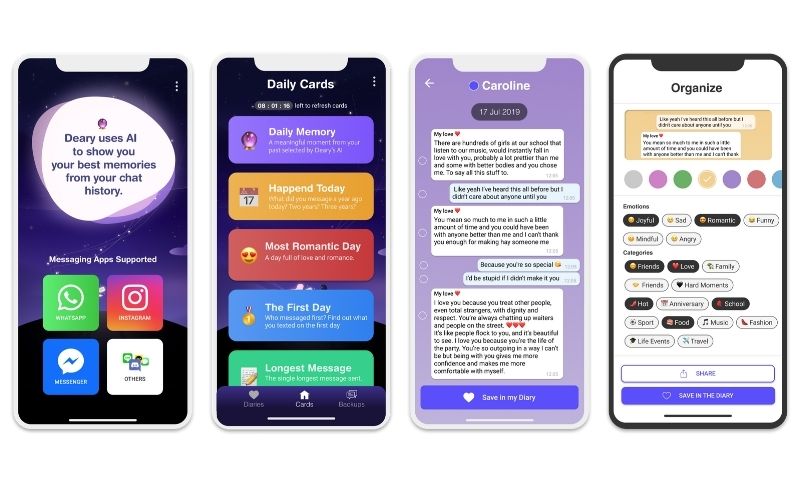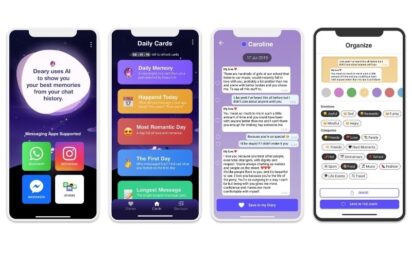Digital memories are a relatively new reward for long-time users of platforms, offering a rose-tinted view of content which might otherwise be forgotten.
Facebook users are regularly served photos from years past which may otherwise have been lost in the digital pile.
Long-time iPhone users are automatically served albums of photos ‘On This Day’. Even Spotify is in the game, recently introducing a ‘Time Capsule’ playlist built from songs you enjoyed years ago based on your listening habits.
But for every photo taken and song listened to, it’s safe to say that tens, if not hundreds, of messages are sent – and these face the same threat of digital elimination.
Enter Deary. Founded by CEO Federico Allegro, AI lead Federico Ghirardelli, marketing lead Francisco Fidalgo and CTO Luca Soldera, the app began life in Italy but has moved to London to benefit from the capital’s tech start-up ecosystem.
Fidalgo had been living in Canada and maintained a long-distance relationship with his girlfriend in Korea. In those three years, the couple exchanged almost half a million messages, which inspired the start-up’s creation.
“I realised how much of our lives were lost inside our chat-history – basically most of our memories together,” he tells BusinessCloud.
“I started wondering: why is it that we have all these devices recording our lives, but we have no way to get some value out of our data?”
The idea had precedence, with digital memory platform Timehop having raised $14m in venture funding.
“They focus mainly on visual content. We think messages are the missing context. What will be able to provide a fuller memory of that experience?” he asks.
“The difficulty is to transform that history into their story.”
Deary currently has around 600 active users per week, a number growing by 20% every week, and has amassed around 9,000 downloads.
Arguably the most innovative feature of the app, which works with WhatsApp, Instagram messaging and Facebook Messenger, is an approach to memory which takes off those rose-tinted specs.
Unlike Facebook’s focus on resurfacing only happy memories via its algorithm (a goal it has failed at least once after reportedly putting a dancing cartoon over a photo of a mother’s grave) Deary allows for a range of emotional memories to be pulled out.
The app’s AI can find happy, sad and joyful memories or topical chats about sport, travel and ‘hard memories’.
“We optimise the AI for what the users like to view the most, regardless of if they are happy or unhappy. The more you use Deary, the more it will know what type of memories you want to relive.
“We offer some level of control over your memories with themed cards. Sometimes these will be a really sad memory, other times a funny one. This gives users a level of control over their Deary experience, as users may feel different each day and want to remember something that matches their mood.”
On the security concerns consumers may have when giving access to a history of private conversation, Deary claims to upload the messages to a “high-end encrypted server” to run its AI models. This AI only has access to a siloed version of the dataset, virtually working with unidentifiable data.
Fidalgo said the AI needs a large user base in order to work property, and intends to “leverage the network effects in messaging apps to acquire users for free”.
The firm’s first round of funding was more modest than Timehop’s, at around $30K from friends, family and an angel investor.
The firm says it has active users in 80 countries and has imported 250m messages over the past seven months of organic growth, with no ad spend. It is currently raising a pre-seed of £500k to expand its team and AI capability.
This despite no clear route to monetisation. “Our main asset is the AI technology we are building, which allows us to recognise what is meaningful inside any kind of conversation,” said Fidalgo.
“So for now, we are not concerned with a business model. Here we share Zuckerberg’s philosophy: until the network is strong enough we won’t think to disrupt it with monetisation; afterwards [we will] scale and our AI will offer plenty of monetisation opportunities.”


